The rise of Dai Le, from refugee to Independent federal MP
In a parliament heavy with Independents, Dai Le has begun to mark her own political path, widely divergent from the teals. How she even ended up there is extraordinary.
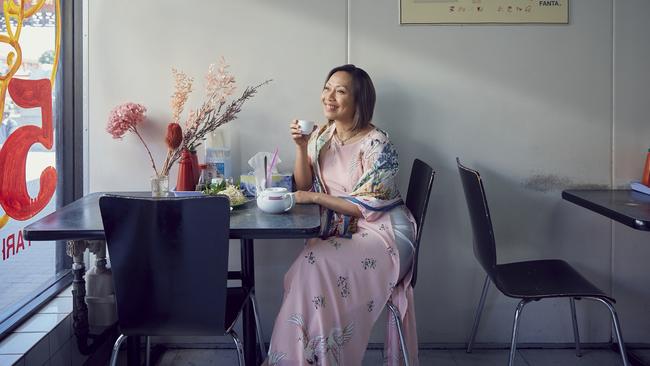
Dai Le, the newish and unexpectedly elected federal MP from south-western Sydney, is late for an interview and her effusive staff, also mostly working on new turf, have guided me into her electoral office. It’s a surprisingly bright and spacious suite in an otherwise uninspiring building in Cabramatta – the cigarette-strewn escalators look like they haven’t been used for years – and we would be chatting here but for a diary clash. The area is about to be used for one of the twice-weekly yoga sessions Le organises for her team, so our interview will instead take place in a nearby Vietnamese restaurant. While waiting for her to arrive, aides have left me in her office, alone.
More experienced or cynical staff might have opted to keep a professional stickybeak in the waiting area, where masked constituents sit patiently under the gaze of the receptionist. On this sunny spring morning I am guided past them, down a corridor where smiling workers appear at multiple doorways to introduce themselves, and into the cavernous room from where the latest member for Fowler presides when parliament is not in session.
The local mayor’s name is scrawled on one corner of a giant whiteboard; on another is a list of “awards” that presumably could be created under the auspices of the new Independent MP. A potted happy plant appears to be thriving and on the large, tidy desk is a photo of Le, her husband Markus Lambert and their adult son Ethan. Amid the “Fowler” and “Dai Le” signs, the only books appear to be a wall full of bound parliamentary debates.
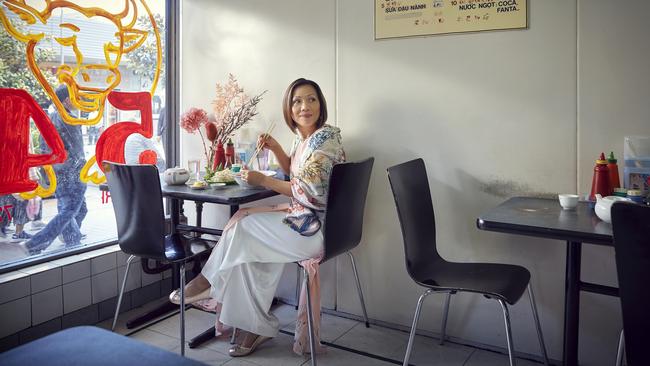
Before there is a chance to peruse further, a staff member appears with a glass of water and apologises for the delay. Then, before you can say “fancy leaving me here unchaperoned”, someone else arrives offering a vase full of fortune cookies, individually wrapped and embossed with bright “Dai Le MP for Fowler” stickers. What message will be revealed from within the folds of this sweetened snack? Wisdom comes in many guises but you don’t usually expect to find it slipped into a biscuit inside a politician’s office. Then again, this is not your standard fortune cookie and Le is no ordinary MP. “May your journey be filled with health, wealth and laughter,” reads the insert, signed “Dai Le MP for Fowler”.
A child refugee whose journey to Australia lasted four traumatic years, Le’s success at May’s federal election was especially sweet. Not only did she triumph over a former premier, defeating Kristina Keneally and seizing a seat that had only ever been held by Labor, she left some on the other side of politics ruing the factional fighting that propelled her towards an independent life. As another former NSW premier, Mike Baird, says: “The Liberal party not preselecting Dai Le is one of the greatest own goals in political history.”
Not many people, it seems, expected her to be here. Not her family, given her truncated education and the assumption, unrealised, that with a lot of hard work she might become a lawyer. Not her long-term political partner Frank Carbone, the Labor-turned-Independent mayor of Fairfield who was planning his own run for Fowler this year. (“She probably thought I would win,” he says.) Even Le herself, months on, is having trouble processing reality. “It’s so hard to accept that I won,” she says as she settles at a table at a Vietnamese restaurant, the short walk from her office having been repeatedly punctuated by greetings from well-wishers.
On the dynamic streets of Cabramatta, Le is such an attraction that even the postman stops to congratulate her in Vietnamese. In the nation’s 47th parliament, where she assumed a seat on the crossbenches in July amid a sea of otherwise largely teal-hued Independents, she is an even bigger anomaly. “People say you can do nothing as an Independent, as a lone voice,” she says as she judiciously slurps a bowl of spicy beef noodle soup. “I think I have more freedom in that house than anyone – to speak of more issues without being constrained, and I can vote with anyone.”
Freedom has a particular meaning to Le, who has experienced its absence more keenly than almost any other sitting member. Born in Saigon (now Ho Chi Minh City) 54 years ago, the eldest of three daughters, her middle-class Catholic family was supported by her father’s unspecified work for the US during the Vietnam War. By Le’s seventh birthday in April 1975 the war was ending and her city was in chaos. “All I remember is people were screaming. I remember military people grabbing my mum and sisters and putting us into a jeep.” Her father was not with them. Driven through fleeing crowds by US soldiers, they were taken to a boat with other terrified families and sent to the Philippines. “When we left Vietnam we were told that those who worked with the Americans would be taken to America,” she says now. “America let us down.” Instead, mother and daughters remained in the Philippines for three years, living in a camp and then a tiny studio until they boarded another boat late one night. Le had no idea of the destination.
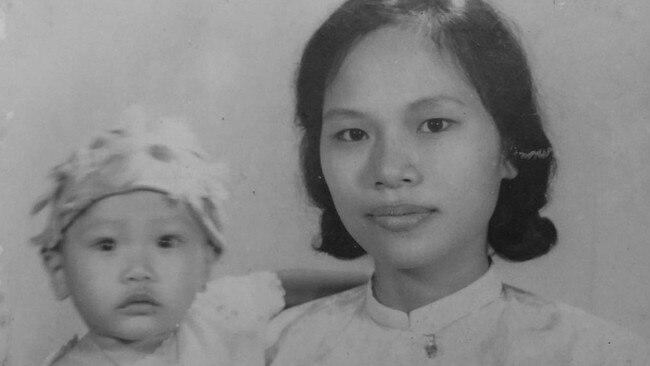
Most of the 36 people packed onto the fishing vessel had been waiting for years to be processed for life in another country. Homeless, they were trapped at sea when an enormous storm arrived. Stuck on a coral reef, unable to eat and with most passengers unable to swim, they were stranded for days and many on board believed they were about to die. There was talk of cannibalism, and when pirates raided their vessel, says Le, “we were lucky that they didn’t rape us”.
For an obedient 10-year-old it was a frightening, bewildering journey that only ended when the flailing vessel was found by a patrol boat and pulled into Hong Kong harbour in early 1979. As Le alighted hours later, tired, hungry and craving an apple and a bottle of Coca-Cola, “my sister was like a dead body”. Still expecting to head to the US, her mother applied for refugee status while Le, primary-school aged but pretending to be 16, began working at two factories.
When she wasn’t toiling on watch bands, Le would be placing folded T-shirts into cellophane bags. With dreams of life in the US failing to materialise, she returned home from work one day to news from her mother. “I remember her saying, ‘I’ve decided to go to an island. It’s a big island. I was told it has the best education system in the world.’” Le had never heard of Australia. “What am I supposed to say? All I am thinking is that I want a proper bed and I want to be able to go to school.”
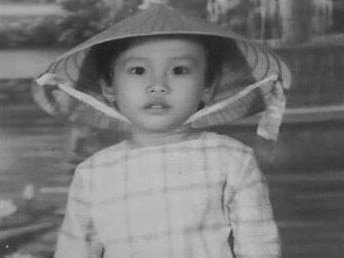
Although it was an intensely difficult and uncertain time, she recalls it mostly in an even tone. She is an affable subject, warm, carefully groomed, her hair immaculate, her fingers bejewelled. The restaurant has filled up over the past hour and a rowdy group of workers is hollering happily at a nearby table. Oblivious to their din, she describes the compound that became her family’s tiny home in Kowloon and the rice that would be allocated to them daily, the staple of their meagre diet. One of her sisters was still weak, often sick, and struggling to gain weight. Desperate to feed her family, Le’s mother swapped her portion on the black market for biscuits.
“We had nothing. One of the things we had was a bowl of just white rice. And she made the sacrifice and traded her portion to get something for us. Life was so hard.” Suddenly her even, carefully controlled manner fails and she is wiping her eyes and crying. “I try to build my strength up not to cry when I talk about my escape because I know others have had it harder than me. I didn’t have a proper childhood. I was forced to live in a camp. At one stage my mother didn’t know whether we would be resettled.” And she falters. “I think back to my home in Vietnam, all the relatives we had to leave behind. I hardly cry. But whenever I talk about those memories …”
Facing open-ended hardship, Le’s mother made a decision that she hoped would improve all their lives: her eldest child would become a nun. “She said, ‘If I give you to God, first of all you will be looked after, you will start your education, at least one of us gets educated.’” Her daughter was even shown her future bedroom. “Coming from a camp life with thousands of people, four of us living in a double bunk, what I saw in that nunnery was amazing: a proper bed, clean, and I would be looked after.” Once again, however, her presumed path was altered. When her mother learnt she would be restricted from seeing her firstborn, the plan fell apart. Soon after, the family was accepted for resettlement in Australia, where Le began a new life in late 1979. Her father was never heard from again.
On the minibus driving south from Sydney, 11-year-old Le was struck immediately by the emptiness of Australia – and also the concern of other refugee families on the bus, who feared they were headed for a re-education camp. In fact, they were being taken to a Wollongong hostel.
“People say you can do nothing as a lone voice. But I have more freedom in Parliament than anyone”
She remained in the area for five years, the longest she’d stayed anywhere. At the local primary school, where she finally resumed her education, she and her sisters were the first Vietnamese refugees to enrol. “Once we got here, the priority was survival, just to adjust to a new culture.” She struggled to learn English “and to find a place … I wanted to be a part of Australia.” By the time she completed high school at a Catholic college, the family had relocated to the south-west region of Sydney that would become the centre of Le’s new world, even as her sole parent battled other realities.
“My mother can’t speak English because when she first got here she had to go and clean people’s houses and clean kitchens. She didn’t go to classes. Back in those days her priority was to get a job,” Le says of her harrowing history, an iteration of the story of countless Australians who have forged new lives here. Yet with few exceptions – Hieu Van Le, South Australia’s governor until last year, is another notable standout – hers is a rare voice that has reached a mass national audience. “There will be a lot of us in the doctor’s area, law, pharmaceuticals,” says Le, the first Vietnamese-born member of Federal Parliament. “But not in the political sphere – because of the Vietnam War, because of the politics of that, people just feel that … it’s better to say nothing, just work and set up a small business.”
That Le has followed another path is not due to politics but, she says, journalism. After being interviewed by her local newspaper for a story on refugees, as a young adult she was encouraged to apply for its ethnic cadetship. She found an unexpected beacon in other people’s histories. “Reflecting back, I was trying to find stories that were similar to mine. Did they struggle the way I did? Did they find it hard to adapt to this country as I did? How did they grow through it?”
The more she heard, the more she realised how many others had also endured trauma; she considers her own experience vital to her new role, representing 130 cultures in one of the most ethnically diverse parts of the country. “No matter what cultural background you come from [there are] many of the same experiences. You have to learn the language, you have to adapt to a new society that you have chosen for a home. You want to have a good education for your children. I can guarantee you every single person, be it from Africa, from Cambodia, from Vietnam, Assyrian, those core foundational values are very important to all of them.”
After several years writing for local papers she landed a traineeship at the ABC, where her first job was as a researcher/producer at Radio National. “To be perfectly honest she was pretty raw,” recalls journalist Geraldine Doogue, a fan who found Le to be canny and resilient. “I’m immensely available for people who are adaptive and she was, and is. It’s not just the [back] story. It’s the fact that she wasn’t brilliant. I have met brilliant people. In her own way she was a little battler and I love seeing those people prosper.”
After four years at the ABC, Le became involved in a local battle for a new Cabramatta car park and in 2008 her husband convinced her to stand for state parliament at the local by-election. “I was so driven by the feeling of unfairness in how my community were treated as second-class citizens: the fact that my community weren’t given a car park when they had been crying out for one for years, and that people had to pay 50 cents to use the [local public] toilet,” she said in her maiden speech to federal parliament in September.
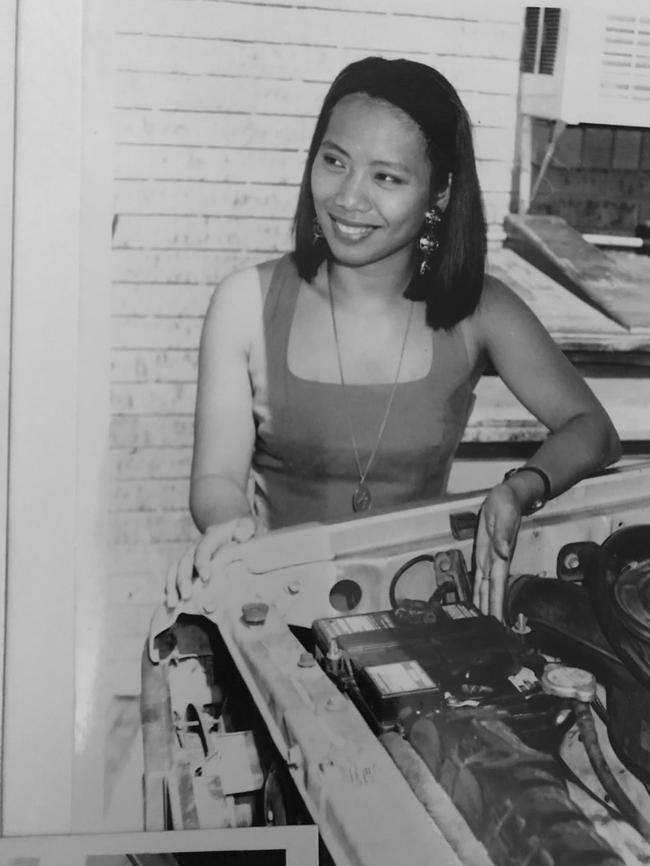
As a novice candidate, she had no clear political allegiances. “I’ve voted different parties all the time,” she told the Australian Financial Review in 2008. “Apparently I’m not supposed to say that, but I said, ‘Listen, I’m my own person, I have my own mind.’” Given her support for small business, she joined the Liberal Party and was preselected. She did not win Cabramatta, but the ALP suffered a swing of about 20 per cent against it. She continued door-knocking, campaigning for more car parking and greater benefits for small business owners, right up to the 2011 state election. She did not win a second time, although in an election in which Keneally’s Labor government was thrashed, Le gained 47.9 per cent of the vote on a two-party preferred basis and secured a 26.9 per cent swing to the Coalition, all but eroding Labor’s margin.
After that loss, she became a political adviser in the northern Sydney electoral office of Joe Hockey, who hired her on the spot. “I wish we had 50 Dai Les in parliament,” enthuses the former federal Liberal treasurer and US ambassador, who remembers Le as authentic and hard-working. “The test of a good community representative is their ability to listen and to deliver outcomes. She understood the community politics.”
While Le was elected to Fairfield council the following year, the allure of state parliament lingered and not even a breast cancer diagnosis or the gruelling treatment that followed was a deterrent. Having twice contested Cabramatta for the Liberal Party, she was Premier Mike Baird’s choice for a winnable spot on the party’s upper house ticket. “What I love about Dai Le is she is passionate, she is community focused when just about all politicians have lost what it means to be an elected representative,” says Baird. “Every fibre in her being is about representing the community she loves.”
Baird’s backing wasn’t enough to secure Le’s nomination to run for the Liberal Party again. “I would call it a great tragedy, and the biggest own goal the Liberal Party could ever do,” says Baird. Hockey, too, was disappointed. “I obviously supported it but couldn’t exert enough influence to get her up. She always preferred and felt more comfortable in south-western Sydney, and there are just no Liberal seats there. She is genuinely of that community.”
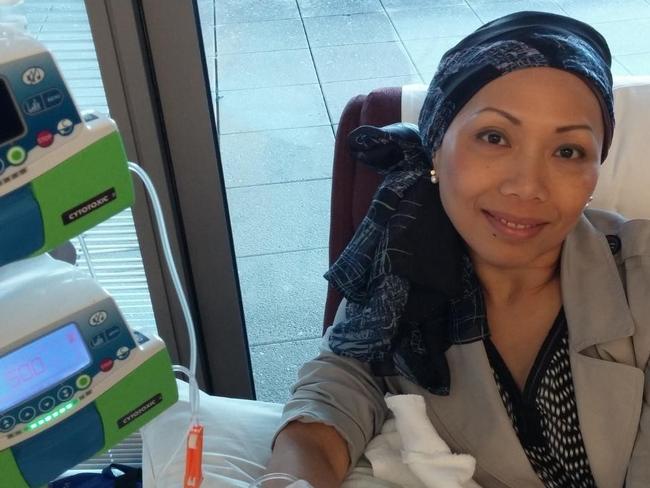
With Fairfield council as her focus, Le’s misfortunes in the Liberal Party continued. In 2016, after two unsuccessful attempts to win a spot in state parliament, and likely to be placed in an unwinnable position on the Liberal ticket at the next local government election, she decided to run for council as an Independent, a move for which she received special dispensation from the NSW Liberal state executive. But it also stipulated that she could not run as an Independent for the separately elected position of mayor against the party’s endorsed candidate. Le defied the mayoral directive and in the sometimes grubby campaign that ensued, her opponent hired a private investigator to gather information on her to determine if she lived locally. While Le was returned as a councillor, her unsuccessful mayoral move meant she was suspended from the Liberal Party for a decade.
Her expulsion seemed rough, but such was the prevailing political atmosphere in her neighbourhood at that time. The former state Labor MP Joe Tripodi had local development aspirations that were dividing the council and party loyalties were often ceding to personal ambition. Liberal councillor Joe Molluso lined up with Tripodi over development prospects in Fairfield, despite the fact they belonged to different political parties. When Le called out the links to Tripodi, it provoked an intense campaign against her by Molluso.
Le, meanwhile, aligned herself with Frank Carbone in the wake of her Liberal Party suspension. Carbone had been a Labor mayor but was dumped from his party’s ticket and then expelled from the ALP for running as an Independent during a tumultuous period which appeared to stem from clashing interests in a $90 million community club development a decade ago.
“My political ideology is about working in the community, and Dai’s ideology was the same,” Carbone says now. “Yes, she comes from the Liberal Party background but she wasn’t entrenched in that ideology. And I wasn’t entrenched in Labor Party ideology.” Like Le, Carbone is still an Independent on council. He is still mayor, and she only recently stood down as deputy mayor. “There’s a saying in politics,” says Le, “that if you keep on running and losing that you won’t be taken seriously. I said to myself, ‘That’s bullshit. If people see me run and I keep on running that means I don’t give up. And every time I run my margin goes up.’”
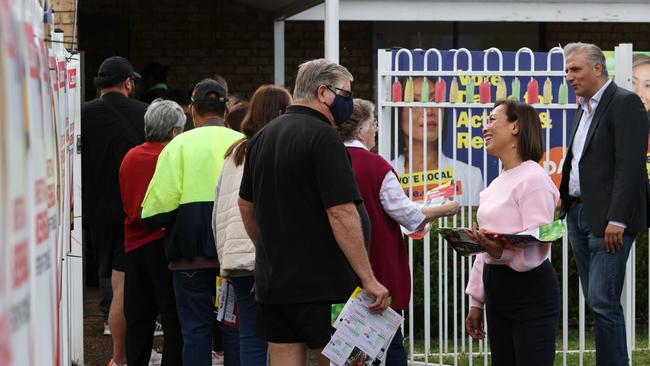
Early this year, with Carbone’s support, she nominated as an Independent for the federal seat of Fowler. The former premier Kristina Keneally was attempting to move from the Senate to the House of Representatives and her preselection by the ALP parachuted her into the seat. A controversial decision, it entailed the former premier moving from her home on exclusive Scotland Island, on the other side of Sydney, to a less affluent community that others knew far better. It also meant that aspiring Labor candidate Tu Le, a Vietnamese-Australian lawyer, was dumped.
While Dai Le’s name was on the ballot as an Independent, Carbone’s photograph appeared prominently on her how-to-vote card above a caption: “If elected we will work together to get the Federal funding that we deserve.”
“We were both going to stand … nominations were signed. I even paid for my posters,” says Carbone, who says he pulled out of the federal race after his brother died and to care for his mother. “To make sure Dai got up … I put my photo on that [how-to-vote card] because we don’t believe on her own she would have got up. I mean Dai is popular but it takes a lot to win a safe Labor seat.”
Le appears to have been very comfortable with the arrangement. “The good thing now, being the federally elected member, obviously my visibility is equal if not higher than him.” She was more concerned about the intrusion of an outsider to her neighbourhood.
“I was driven by the feeling that my community were treated as second-class citizens”
“Politics at the end of the day is very local. But the major parties over the years have really moved away from that. And to have Kristina Keneally preselected for this seat is an indication that they only think about the party,” says Le, who defends herself from accusations thrown at her over the years about her own living arrangements. (She has previously lived in inner-west Dulwich Hill and now resides in her electorate). “I grew up here, I went to school here … my family is here,” she says.
That local political flavour even filtered through to the late part of the federal campaign when a 2019 voicemail emerged of Le claiming, after a meeting of the Cabramatta branch of the Liberal Party, that “I am still in control of the branch”. (Although a leaked voicemail and vision of her attending the meeting of her old party were aired, she says she was quoted out of context.)
After her federal win, she and Carbone are still close. “We collaborate a lot,” says Le, noting that three quarters of Fowler is covered by Fairfield City Council. “We’re keeping each other abreast of issues on a local level that I can make representations at a Federal level.” Or as Carbone, the popularly elected mayor, says: “Dai is the federal MP, she runs the show but I am there to support her.”
Both were vocal during last year’s Covid lockdowns when their community endured the state’s toughest restrictions, including a curfew, increased testing and restricted movement. “We had helicopters hovering every night,” says Le, for whom, like many residents, the sound triggered traumatic memories. “If they did this in friggin’ Bondi you wouldn’t hear the end of it. But because people here, English is their second language, their children have grown up in an area where you are not supposed to challenge authority, it was easy to implement those harsh measures.”
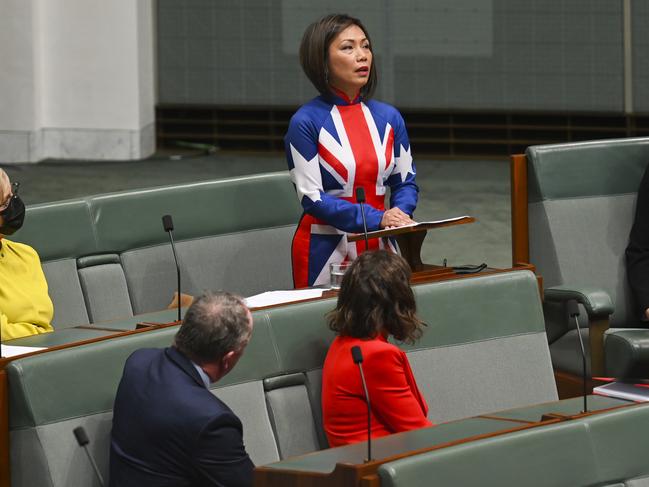
In a parliament heavy with Independents, Le has already begun to mark her own political path, one that is often widely divergent from most of the teal-hued Independents. She initially opposed the government’s industrial relations bill and she abstained from voting on its climate change bill, with its goal of achieving net zero by 2050, wanting instead more details on how it would impact the low-income families, already confronting high food, fuel and energy prices, in her electorate.
“We are the backbone of the NSW economy,” she said of her beloved community during her inaugural address to parliament, an event for which she was clad in a traditional Vietnamese áo dài dress fashioned from an Australian flag. “This was evident during the Covid pandemic, when almost everything came to a halt because our tradies, truck drivers, retail workers, nurses, teachers and office workers were locked down.” The striking image of the new member wearing a garment fusing her two cultures was widely publicised. “The last time I looked, a government that takes away an individual’s liberty to choose how they want to live, work and raise a family was called a communist dictatorship, a political system that my family and I and many other refugees escaped from.” With 250 supporters in the public gallery, she received a standing ovation.
Having won 51.6 per cent of the vote after preferences, it was a triumphant declaration on a national stage. But the real pinch-me moment for Le came weeks earlier, when she was officially declared winner of the seat and she stood at the doorway to her future. “They gave me the keys to the office, and it was surreal,” she says, even now agog. “I’m still Dai, that refugee kid.”




To join the conversation, please log in. Don't have an account? Register
Join the conversation, you are commenting as Logout